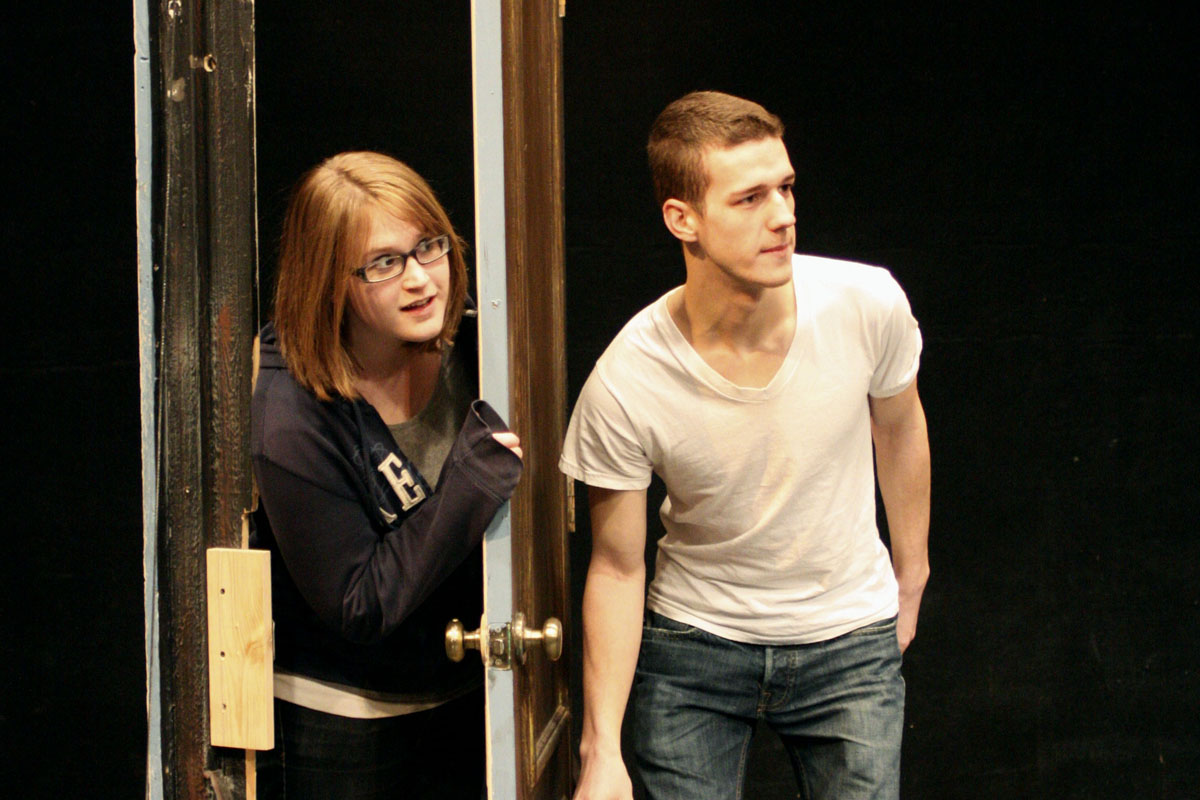Theater students bring English classes to life
In English classes at USU, students often sit down as a class to read and study a play, but it is unusual for the class to have the opportunity to see the play in action.
Liz Gabbitas, a sophomore in theater with an emphasis in directing, has organized a group of theater students to travel to USU English classes and perform excerpts from the plays the students are studying. She calls it the dramatic literature project.
Gabbitas contacts teachers and asks them what kind of plays their students will be reading for the semester. She then starts putting together a group of theater students who will go to respective English classes and perform a part of the dialogue for the students.
This year they have performed scenes from “Death of a Salesman” by Arthur Miller, “Mrs. Warren’s profession” by George Bernard Shaw and a few of Shakespeare’s works, including “Macbeth,” “Othello” and “The Tempest.” Gabbitas said they had five different performances last semester and 11 set up for this semester.
“It’s actually a lot of work for just me, so I’m trying to get the whole thing more organized right now,” Gabbitas said.
Michaela Burt, sophomore in theater, said after they perform a scene, the actors discuss with the class how they think theater is intrinsically different than normal literature. They talk about the political and economic background of when the play was written and how it’s relavent today.
“We discuss the choices the actors and directors made, and how it made the play different from when they were just reading it,” she said.
Susan Ballif, a senior in theater who has directed some of the projects, said, “Plays are written to be seen. There are spoken moments in text that don’t necessarily come through in just reading. The dialogue and action put you in the moment of a person’s decision, and you can experience that moment with them.”
Burt said theater has always been pushing for social change. To her, it is the playwright’s way of speaking out.
“There are things in the world that need to be talked about, so we do our best to get those ideas out there, by creating moments for people to watch,” Burt said.
The whole idea started when Gabbitas was bored in high school English class, and said they were studying some great plays.
“I remember thinking that these lines were meant to be seen and heard,” she said. “So I asked my teacher in high school if I could put together a scene and perform it for the class. She said yes and it ended up being really fun, so I brought the same idea to Utah State.”
The students who participate in these projects believe it is important to see action created instead of just imagining it.
“It’s easier to remember things you’ve seen and heard,” Burt said. “Apparently, 80 percent of what you remember is related to some form of movement. Through action, words will become so much more meaningful and real.”
She said to her, the playwrights aren’t just old dead poets. The things they wrote are relevant to today. The students want to make sure that’s communicated through their performances.
The theater department is also putting together a new project that would provide students the opportunity to perform for the Cache Valley high school English classes.
Dr. Matt Omasta, a theater education professor at Utah State, is working on a grant proposal to get funding for the project. Gabbitas said they want to go into each class six times for each play the high school students study. The theater majors will then teach the students about theater and help them to learn to design sets, how to direct and act and create costumes.
“It’s all in the planning stages, but we are hoping to get this project going by next fall,” Gabbitas said. “We’re just waiting for funding because we want to get the very best students to come do it with us, and have really quality performances.”
Ballif said the participating students hope the dramatic literature project will continue even after they leave.
“It’s always interesting to see how other people interpret the text, even fellow theater students, and it changes the whole motive of a scene,” she said. “No one is static when they speak in real life, so if that’s how a play is being read, it’s not what the playwright wanted.”
Gabbitas said she put the project together because she and the other theater students feel a responsibility to help people understand what theater is all about.
“Theater, literature, music, all of the humanities are so important because they provide a mirror for life,” she said. “They provide their audience with an opportunity for introspection, to look at their lives and the world through different eyes. That is why we do what we do.”
– kmarshall222@gmail.com

